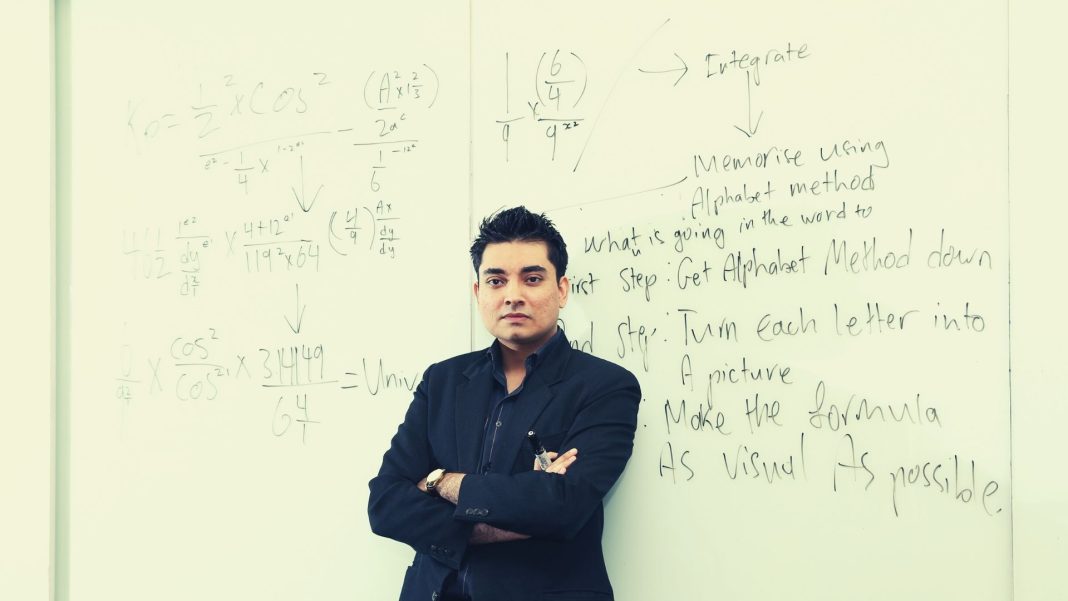A Mind-Blowing Conversation with Umonics Method CEO Sancy Suraj
As an editor, I had the pleasure of sitting down with Sancy Suraj, the CEO of the Umonics Method, to discuss the fascinating world of memory training and early childhood education. The Umonics Method is a unique program that uses memory techniques to help young children develop critical thinking skills, enhance their memory, and succeed academically and personally. In our conversation, Sancy shared his expertise on various topics related to the Umonics Method, including common misconceptions about memory training, challenges of teaching memory techniques to young children, and the future of memory training and early childhood education.

Can you tell us about a particularly mind-blowing experience you’ve had while teaching memory techniques to young children with the Umonics Method?
Certainly, I would be delighted to share my experience teaching memory techniques to young children with the Umonics Method. Every day with the Umonics Method is mind-blowing. Witnessing the progress of our students is an incredibly rewarding experience. However, there is one particular moment that stands out to me.
One of our students was having difficulty remembering the multiplication table. Despite hours of practice, he could not seem to recall the information. I decided to try a new method of teaching him the multiplication table. Instead of simply memorizing the numbers, I associated each number with an animal, and he was to imagine these animals jumping over a fence in a certain pattern. I still remember the excitement in his eyes when he finally understood the pattern and was able to recite the multiplication table flawlessly.
Seeing a child who was previously struggling with a concept suddenly understand and remember it with ease is incredibly satisfying. It is a testament to the effectiveness of our memory techniques, and the immense potential of the human brain.
This experience was particularly mind-blowing because it demonstrated the importance of approaching education with creativity and flexibility. The traditional methods of memorization do not work for every child, and it is essential to find the method that works best for each individual. The Umonics Method recognizes this fact and uses innovative and adaptable techniques to ensure that every child can maximize their memory potential.
Overall, every day with the Umonics Method is full of mind-blowing experiences. Watching young children develop their memory skills and discover their potential is truly incredible. It is an honor to be a part of their learning journey and to witness the transformation that takes place in their lives.
What are some common misconceptions about memory and memory training that you’ve encountered, and how do you address these misconceptions with your clients?
As the CEO of The Umonics Method, I have come across several misconceptions about memory and memory training. One common misconception is that memory is an innate ability that one is either born with or not. This is not entirely true, as memory can be improved with the right training and techniques. At Umonics, we have seen preschoolers who were struggling with remembering simple things like their own names make remarkable progress through our memory training program.
Another misconception is that memory training is only for individuals who are struggling with memory problems or cognitive decline. While memory training can certainly benefit individuals who are facing such issues, it is also an effective tool for individuals who want to enhance their memory skills and perform better in their academic or professional lives. At Umonics, we believe that memory training is an essential life skill that should be taught to children from a young age, just like reading and writing.
A third misconception is that memory training involves tedious and boring techniques that are difficult to implement in real-life situations. However, at Umonics, we make sure that our memory training program is engaging and fun for young children. We use interactive games, storytelling, and visual aids to teach memory techniques that are practical and easy to remember. We believe that making memory training fun and interactive not only helps children to remember more effectively, but it also cultivates a love for learning that lasts a lifetime.
In addressing these misconceptions with our clients, we emphasize the importance of memory training as a skill that can be learned and improved upon. We also explain how our program is designed to be enjoyable and effective, using techniques that are easy to implement in everyday situations. We believe that by educating our clients on the benefits and practicality of memory training, we can dispel common misconceptions and help more individuals realize their full potential.
How does the Umonics Method stay up-to-date with the latest research and developments in memory science and early childhood education?
At the Umonics Method, we believe in constantly improving our program to ensure that we are providing the best possible memory training for young children. To stay up-to-date with the latest research and developments in memory science and early childhood education, we rely on a variety of sources.
One of the primary ways we stay informed is by reading academic journals and attending conferences in the fields of psychology, neuroscience, and education. This allows us to learn about new studies and research findings, as well as to connect with other experts in the field.
We also work closely with our team of psychologists and education specialists to review and update our curriculum regularly. By integrating new research findings and best practices into our program, we are able to provide our students with the most effective memory training techniques.
In addition, we stay up-to-date with the latest developments in educational technology. This allows us to incorporate new tools and platforms into our program, such as gamified learning and digital flashcards, to enhance the learning experience for our students.
Ultimately, our goal is to provide the most comprehensive and effective memory training program for preschoolers, and we are committed to constantly improving and evolving our program to meet the needs of our students and keep up with the latest research and developments in the field.
“At the Umonics Method, we believe in a continuous cycle of learning and growth. By staying up-to-date with the latest research and developments in memory science and early childhood education, we can provide our students with the most effective and innovative memory training techniques.”
In your opinion, what are some of the most important skills that young children should develop in order to succeed academically and personally, and how does memory training fit into that?
As a CEO of The Umonics Method and a memory athlete, I firmly believe that developing memory skills in young children is crucial to their academic and personal success. However, memory training is just one piece of the puzzle, and there are several other essential skills that young children should develop to succeed academically and personally.
Firstly, children should develop strong critical thinking skills, which allow them to analyze, evaluate, and interpret information effectively. Critical thinking skills are essential for success in all academic subjects, as well as in personal life. They help children make better decisions, solve problems, and think creatively.
Secondly, children should develop effective communication skills, which include listening, speaking, reading, and writing. Good communication skills are vital for success in all aspects of life, from academic and professional settings to personal relationships. Effective communication skills enable children to express themselves clearly and confidently, understand others’ perspectives, and build meaningful relationships.
Thirdly, children should develop strong social and emotional skills, such as empathy, self-awareness, self-regulation, and social awareness. These skills help children understand and manage their emotions, build healthy relationships, and make responsible decisions. Social and emotional skills are essential for personal well-being, as well as success in academic and professional settings.
Finally, memory training is a crucial skill that should be developed in young children. The ability to retain information effectively is essential for success in all academic subjects, as well as in personal and professional settings. Memory training helps children to learn more efficiently, retain information better, and recall information quickly and accurately.
At The Umonics Method, we believe that memory training is just one piece of the puzzle, and we incorporate all of these essential skills into our program. We help children develop strong critical thinking, communication, social, emotional, and memory skills, which are crucial for their academic and personal success.
How does the Umonics Method address the unique challenges and opportunities of teaching memory techniques to young children, such as attention spans and differing learning styles?
The Umonics Method is specifically designed to address the unique challenges and opportunities of teaching memory techniques to young children. One of the biggest challenges is attention span. Children have shorter attention spans than adults, so it is important to keep them engaged and motivated throughout the learning process. The Umonics Method accomplishes this through interactive and engaging games and exercises that make learning fun and enjoyable for children.
Another challenge is differing learning styles. Children learn in different ways, and the Umonics Method recognizes this by incorporating multiple learning modalities into the program. This includes visual aids, auditory cues, and kinesthetic activities, which cater to different learning styles and ensure that all children can benefit from the program.
The Umonics Method also recognizes that young children have developing brains and may not yet have fully developed cognitive abilities. As such, the program is designed to be age-appropriate and to gradually build upon existing cognitive abilities. For example, young children may have difficulty with abstract thinking, so the Umonics Method incorporates concrete and tangible memory aids, such as pictures and objects, to make the learning process more accessible.
Finally, the Umonics Method recognizes that young children are not just learning about memory, but also about social and emotional development. The program incorporates activities that help children develop interpersonal skills, such as teamwork and communication, which are essential for success both academically and personally.
Overall, the Umonics Method takes a holistic approach to teaching memory techniques to young children. By addressing attention spans, differing learning styles, cognitive abilities, and social and emotional development, the program ensures that children can benefit fully from the program and develop the skills they need to succeed in all areas of their lives.
“The Umonics Method understands that teaching memory techniques to young children is not just about improving their memory skills, but also about nurturing their overall development and preparing them for a lifetime of success.”
Sancy spoke passionately about his experience teaching memory techniques to young children and shared a mind-blowing experience where he witnessed a 6-year-old child remember an entire deck of cards. He emphasized that memory training is not just about rote memorization but rather a technique that helps children develop critical thinking skills, enhances their creativity, and improves their problem-solving abilities. Sancy also addressed common misconceptions about memory training, such as the belief that memory is an innate ability that cannot be improved. He explained that memory is like a muscle that can be trained and improved over time.
Sancy also shared how the Umonics Method stays up-to-date with the latest research and developments in memory science and early childhood education. He explained that the Umonics Method is constantly evolving and adapting to the latest research, incorporating new techniques and strategies to enhance its program. Sancy emphasized the importance of staying current with the latest research to ensure that the Umonics Method continues to be a leader in memory training and early childhood education.
When discussing the most important skills young children should develop to succeed academically and personally, Sancy emphasized the importance of developing critical thinking skills, problem-solving abilities, and creativity. He explained how memory training fits into this by helping children develop these skills through the use of memory techniques. Sancy also addressed the unique challenges and opportunities of teaching memory techniques to young children, such as attention spans and differing learning styles. He shared how the Umonics Method addresses these challenges by using interactive and engaging methods that cater to different learning styles.

Looking ahead, what do you see as the future of memory training and early childhood education, and how does the Umonics Method plan to continue innovating in this field?
As we move into the future, memory training and early childhood education will continue to evolve and innovate. With advancements in technology and new research in cognitive science, there will be even more opportunities to improve memory techniques and educational practices for young children. At the Umonics Method, we plan to continue to stay at the forefront of these developments, constantly seeking out new ways to improve our methods and incorporate the latest research.
One area of innovation we see in the future is the use of technology in memory training and education. There are already many apps and programs that incorporate memory techniques, but we believe that there is even more potential in this area. By using virtual and augmented reality, for example, we can create immersive experiences that engage young children in learning and memory training in a whole new way.
Another area of focus for us is individualized learning. We know that every child learns differently and has their own unique strengths and challenges. By incorporating personalized learning plans and adapting our methods to meet the needs of each individual child, we can maximize their potential and help them succeed academically and personally.
Finally, we believe that there will continue to be a greater emphasis on the importance of social and emotional learning in early childhood education. At the Umonics Method, we have always recognized the connection between memory training and emotional intelligence, and we plan to continue to incorporate these skills into our programs. By teaching children to manage their emotions and work well with others, we can help them not only succeed academically but also thrive in their personal relationships and future careers.
In summary, the Umonics Method plans to continue to innovate and stay at the forefront of memory training and early childhood education. By incorporating new technologies, individualized learning plans, and a focus on social and emotional learning, we believe that we can help young children develop the skills they need to succeed academically and personally in the rapidly changing world of the future.
“By embracing new technologies and personalized learning, and continuing to prioritize social and emotional development, the Umonics Method is committed to shaping the future of memory training and early childhood education, one child at a time.”
In conclusion, my conversation with Sancy Suraj, the CEO of the Umonics Method, was truly eye-opening. Sancy’s expertise in memory training and early childhood education was evident throughout our conversation, and I am grateful for the opportunity to learn more about this fascinating field. The Umonics Method is a unique program that is changing the way we think about memory training and early childhood education, and I am excited to see how the program continues to innovate and evolve in the years to come.





